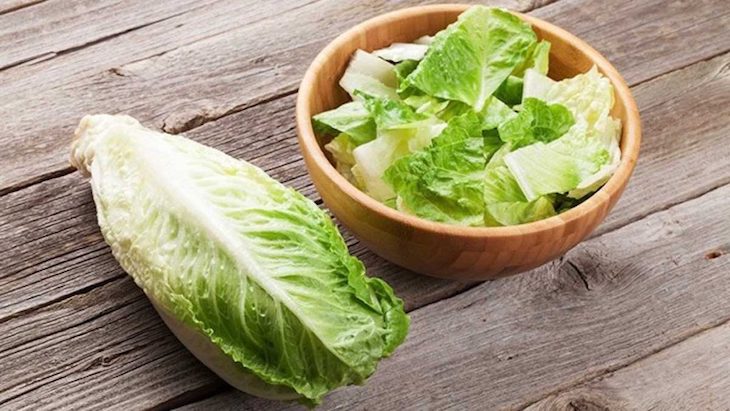The FDA has identified a common grower in the three ongoing E. coli O157:H7 outbreaks that are linked to or associated with romaine lettuce. A statement from FDA commissioner Frank Yiannas issued last night updated the public on the investigation into these outbreaks. While a common grower, not named at this time, has been identified, the outbreaks are “currently being considered as three separate outbreaks caused by three different strains of E. coli O157:H7,” according to the statement.

These outbreaks were all identified at different times in November 2019 and early December 2019. While the FDA has identified a common grower in these outbreaks, Yiannas states “Because of the expansive nature of these outbreaks, our investigation remains a complicated work in progress, and it is too soon to draw definitive conclusions.” The FDA has not been able to request a targeted recall from specific growers because they don’t have enough traceback information yet.
The E. coli O157:H7 outbreak linked to romaine grown in Salinas California
A large E. coli O157:H7 outbreak linked to romaine grown in the Salinas, California growing region has sickened 102 people in 23 states. The Maryland Department of Health was the first to spot the outbreak, and found the outbreak strain in a bag of Ready Pac Foods Bistro Chicken Caesar Salad. The Wisconsin Department of Health Services found E. coli O157:H7 in one unopened bag of Fresh Express Leafy Green chopped Romaine. One recall was issued for Missa Bay salad products on November 21, 2019 in association with this outbreak.
Fifty-eight people have been hospitalized in this outbreak, and 10 have developed hemolytic uremic syndrome (HUS), a type of kidney failure. The FDA, CDC, and USDA issued a public health alert on November 22, 2019, warning consumers to avoid eating any romaine lettuce grown in Salinas, California.
The Fresh Express Sunflower Crisp Salad outbreak in the Midwest
An E. coli O157:H7 outbreak in the upper Midwest has sickened nine people in Minnesota, Wisconsin, and North Dakota. The same strain of E. coli has also sickened 24 people in Canada. This outbreak is linked to Fresh Express Sunflower Crisp Chopped Kit bagged salad, which was recalled in Canada but not in the U.S.
Three people have been hospitalized in this outbreak, and one person has developed HUS. Officials are not sure if romaine in this salad kit is the culprit in the outbreak, or if another ingredient is contaminated.
An E. coli O157:H7 outbreak associated with Seattle Evergreen restaurants
And an E. coli O157:H7 outbreak in the Seattle, Washington area associated with six Evergreen restaurants has sickened 13 people; 10 cases are lab-confirmed and three cases are probable. Three people have been hospitalized in this outbreak. Seattle-King County officials have not named a food source in this outbreak, although the FDA has.
The Yiannas statement identifies challenges
While Yiannas says that some factors, such as whole genome sequencing, federal and state coordination on investigations, and voluntary labeling adopted by the romaine industry, has made progress in this investigation possible, he identifies issues with traceback as challenging.
Public health officials have used traceback for years to try to isolate a source of food that is causing illnesses. These investigations require specific details about food exposures from patients. Once those details are obtained, investigators dig into records that are supposed to be kept by all members of the food supply chain, from the point of purchase, through processing, shipping, and farms. This is a complex process that can take days and weeks.
Investigators look at records from retail establishments such as restaurants and grocery stores, suppliers, distributors, and the farm or farms that may have grown the lettuce. The FDA has also launched a sampling assignment to monitor romaine lettuce as it is distributed around the country that is supposed to continue through 2020.
But those traceback efforts have not yet yielded specific results, other than identifying an entire growing area. In the huge and deadly E. coli O157:H7 outbreak in 2018, also linked to romaine lettuce, officials were only able to state that the lettuce came from the Yuma, Arizona growing region. They found the outbreak strain of E. coli in canal water in that area. There were 210 people sickened in that outbreak, including 96 who were hospitalized and five patients who died.
Meanwhile, consumers are still being advised to avoid romaine lettuce from Salinas, California. The growing season in that area supposedly ended in November, but a statement from the Wisconsin Health Department dated December 10, 2019 about the first large E. coli O157:H7 outbreak states, “romaine from Salinas Valley is still available on many store shelves. It is important to look at product labels for any mention of Salinas Valley, California, and avoid purchasing these products.”
How to protect yourself
So what can you do to protect yourself and your family? Even thought the FDA has identified a common grower in these outbreaks, and the romaine may still be on the market, there are things you can do.
First, make sure you look carefully at every single package of romaine and salad mix you buy to see if the words “Salinas, CA” are on them. The lettering may be very small and the identifier may be on the back of the bag under other information.

If you or a loved one has been diagnosed with food poisoning, you can contact attorney Fred Pritzker for help by calling 1-888-377-8900 or 612-338-0202.
Second, if you have family members in a high risk group for serious complications of food poisoning, avoid romaine lettuce for now. Those individuals include the very young, pregnant women, the elderly, and anyone with a compromised immune system or chronic illness such as diabetes. You may want to think about only serving cooked greens at this time; thorough cooking will destroy pathogens.
Third, always wash all produce before you prepare or serve it. Rinse under cool running water and dry with clean paper towels. Rinse and scrub all firm-skinned produce before you peel it, since peeling can force bacteria from the skin to the flesh.
And know the symptoms of an E. coli infection, which include a mild fever, some vomiting, severe and painful abdominal cramps, and diarrhea that is typically bloody or watery. If anyone is experiencing those symptoms, they should see a doctor as soon as possible.




